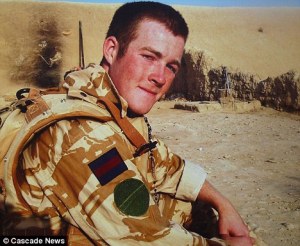You are currently browsing the tag archive for the ‘Afghanistan’ tag.

From left to right: Gunnery Sgt. Aaron Kenefick, 1st Lt. Michael Johnson, Cpl. Dakota Meyer and Navy Corpsman 3rd Class James Layton. (Photo by Brent Layton)
Heroism in ambush may yield top valor awards
By Dan Lamothe – Staff writer for Marine Corps Times
With no air or artillery support, the Marines of Embedded Training Team 2-8 were trapped deep in a kill zone in eastern Afghanistan. Their radios worked only sporadically, and dozens of insurgents fired on them repeatedly from three sides.
“We’re surrounded!” Gunnery Sgt. Edwin Johnson yelled into his radio in the early-morning hours of Sept. 8, 2009. “They’re moving in on us!”
At least twice, a two-man team attempted to rescue their buddies, using an armored vehicle mounted with a .50-caliber machine gun to fight their way toward them. They were forced back each time by a hail of bullets, rocket-propelled grenades and mortars. An enemy bullet hit the vehicle’s gun turret, piercing then-Cpl. Dakota Meyer’s elbow with shrapnel. He shook it off, refusing to tell the staff sergeant with him because he didn’t want to make the situation worse, according to U.S. Army documents outlining a military investigation of the ambush.
What he did next will live on in Marine Corps lore — and, some say, should earn him consideration for the Medal of Honor.
After helicopter pilots called on to respond said fighting was too fierce for them to land, Meyer, then 21, charged into the kill zone on foot to find his friends. Under heavy fire, he reached a trench where the pilots had spotted the Marines, by then considered missing.
He found Johnson, 31; Staff Sgt. Aaron Kenefick, 30; 1st Lt. Michael Johnson, 25; Navy Hospital Corpsman 3rd Class James Layton, 22; and an Afghan soldier they were training — all dead and bloody from gunshot wounds. They were spread out in the ditch, their weapons and radios stolen.
“I checked them all for a pulse. There [sic] bodies were already stiff,” Meyer said in a sworn statement he was asked to provide military investigators. “I found SSgt Kenefick face down in the trench w/ his GPS in his hand. His face appeared as if he was screaming. He had been shot in the head.”
Rather than give up, Meyer, of Greensburg, Ky., fought to bring his buddies back home. Bleeding from his shrapnel wound and still under fire, he carried their bodies back to a Humvee with the help of Afghan troops, and escorted them to nearby Forward Operating Base Joyce, about a mile to the northeast of Ganjgal…”
To read the entire story of this heroic Kentuckian click here.
What I found most noteworthy about this story is how Cpl. Meyer refuses to read the media coverage of what he did. “The main thing that we need to get from that day,” he is quoted as saying, “is that those guys died heroes, and they are greatly missed. This isn’t about me. If anything comes out of it for me, it’s for those guys.”
This is a true sign of a hero: a person who does not realize the grandeur of the deed he has accomplished. I happened to stumble across this article while driving through Kentucky in the Louisville Courier Journal, which carried the story. It obviously gives me no small amount of pride that a fellow Kentuckian could accomplish such a magnificent deed.
but I could not pass this story up, since it is along the same lines as the last post about the Catholic Marine.There are those who might consider such religious practices as something incompatible with heroism and the military life. However, true men, see the value of prayer, even AND MOST ESPECIALLY FOR WARRIORS.
Colonel John W. Ripley, to whom this blog is dedicated, screamed “Jesus, Mary, get me there,” when he saw his strength fading under the Dong Ha bridge. He did so because he saw the value of calling upon God (for Whom it is child’s play to create universes) in his hour of need. Colonel Ripley received the Navy Cross for his heroic efforts but readily admitted it would not have been possible without Divine Assistance and was not ashamed to say so in public.
This story is about a British Soldier named Glenn Hockton, who likewise attributes his survival, after two near death experiences in war, to the fact that he carries the rosary. On one occasion he was shot in the chest and his parents still have the bullet which lodged in his body armor. More recently his mother described how he felt like he had been slapped on the back. When his rosary fell to the ground, he reached down to pick it up, only to realize he was standing on a land mine. The ironic thing about this story is that Glenn’s grandfather, who fought in WWII, also attributed the rosary to saving his life, when he miraculously survived an explosion that killed six members of his platoon. If you have not done so already, read the rest of this story by clicking here.
Similar stories have been documented in the articles No Greater Love and The Ideal Soldier.
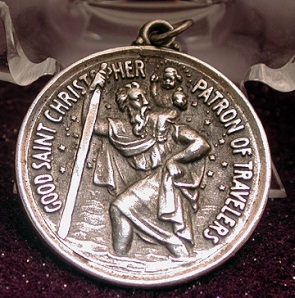
Those who wear St. Christopher's medal (shown here), do so because he is the patron Saint of safe travel.
However, this Marine had a little help, from above, and from a very good mother.
* * *
Wounded Marine from Adams County ready to return to unit
By KATHARINE HARMON
July 25–Lt. Nathan Jeffcoat, of Orrtanna, didn’t always want to be a U.S. Marine, but it’s safe to say it’s something that runs in his blood.
After being hit by an improvised explosive device, IED, in Afghanistan on June 30 and traveling back to the states, doctors went looking for him in his hospital room to do physical therapy, and the platoon commander in the 3rd Battalion, 6th Marines was nowhere to be found.
Turns out, in true commander fashion, he had escaped and made his way through a quarantined hospital area to check on one of his men who had been injured two weeks before him, and was still in the hospital.
Jeffcoat knows he’s a lucky man, a lucky Marine…
“He’s really, really lucky,” [his mother] Sue said, as she watched her son.
She breaks the eye contact to say she tells him all the time it’s because of the number of times she said the rosary for him, and all the prayers.
When he came back, the only things he had on him where his dog tags, watch, St. Christopher’s medallion and his rosary.
“Pray pray pray,” Sue Jeffcoat said.
That’s how they got through this, and that’s how they’ll get through it during the next tour.
To read the complete story about this tough Marine and his mother click HERE.
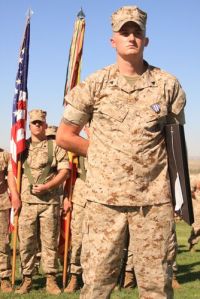
Lance Cpl. Daniel Hickey standing tall with his newly pinned Silver Star. (Photo by Cpl. Andrew S. Avitt)
July 26, 2010
Marine Corps News|by Lance Cpl. Andrew D. Thorburn
MARINE CORPS AIR GROUND COMBAT CENTER TWENTYNINE PALMS, Calif. — In the chaos and danger of battle, Marines are trained to look out for each other, take control and bring chaos to their enemy.
Lance Cpl. Daniel Hickey, a machine gunner with 1st platoon, Company G, 2nd Battalion, 7th Marines, did all these things and helped save lives in Afghanistan in 2008. For his actions, he was awarded a Silver Star during a ceremony at Lance Cpl. Torrey Gray Field, July 16. Hickey demonstrated great heroism during combat when his patrol came under attack by medium machine gun fire and rocket propelled grenades during an ambush.
“We were doing a routine patrol in an area not normally patrolled,” said now Cpl. Hickey, a team leader with 2nd Bn., 7th Marines. “We started taking contact from our right flank. After we started taking contact, my vehicle commander told my driver to stop.”
Hickey said, the commander dismounted the vehicle and fired on the enemy. In a fierce exchange, the vehicle commander was struck in the upper right thigh and went down. Hickey exited the vehicle and pulled the commander into the cab while returning fire with his squad automatic weapon… To read more click here.
by Jim Hanson
“SSG Sal Giunta, a paratrooper w/ the 173rd Airborne, is likely to be the first living Medal of Honor recipient since the Vietnam War. He earned this by charging a group of Taliban who were trying to make off with a wounded comrade in the Korengal Valley of Afghanistan. His actions broke the Taliban’s attack and allowed him to regain control of SGT Josh Brennan. He also saved the lives of the many other members of his unit who had been caught in a near ambush by the Taliban. Giunta didn’t hesitate one second before advancing on his own to ensure the enemy would never take one of ours, but sadly Josh Brennan was too badly wounded too survive. His cousin PVT Joe Brennan recently graduated airborne school and has joined the same unit proudly carrying on Josh’s memory.
…Giunta was a Specialist when the action occurred and his squad was hit with a well-planned ambush at extremely close range. He was the trail team leader and Josh Brennan was the lead. When the fighting started Brennan was severely wounded, their squad leader was knocked to the ground, their medic was killed and several others were wounded. Giunta immediately began maneuvering toward the enemy throwing grenades and eventually charging them when he saw two of them hauling Josh away. He emptied a magazine killing one and wounding the other and grabbed Brennan telling Josh to stay with him so that he would get a chance to tell heroic stories. They did get Brennan on a medevac chopper, but unfortunately his wounds were too severe and he didn’t survive. But Giunta’s actions stopped the Taliban from taking him and by running headlong at the enemy he disrupted the ambush. SSG Giunta’s story can be read in Junger’s book “War” starting on page 115.
It has been far too long since we have awarded the Medal of Honor to someone who survived, and SSG Giunta is a wonderful addition to the ranks of those who have earned our country’s highest honor. There are a number of others under consideration for this decoration and hopefully this is a sign that more of these brave warriors will be recognized. We have heard this was approved by the White House and they are only waiting to set a date for the ceremony.
We salute SSG Giunta and all who serve or have served our country….”
Seeing A Fallen Soldier Home
By Colleen M. Getz
His name was Marine Lance Cpl. Justin Wilson – although I did not know it when his life brushed mine on March 25 at Ronald Reagan Washington National Airport. Lance Cpl. Wilson was not there in the terminal that afternoon; at age 24 and newly married, he had been killed in Afghanistan on March 22 by a roadside bomb. A coincidence of overbooked flights led our lives to intersect for perhaps an hour, one I will never forget.
I did not meet his family that day at the airport, either, although we were there together that evening at the gate, among the crowd hoping to board the oversold flight. I did not know that I had a boarding pass and they did not. I did not know they were trying to get home to hold his funeral, having journeyed to Dover, Del., to meet his casket upon its arrival from Afghanistan.
I also did not know that they already had been stuck for most of the day in another airport because of other oversold flights. But I did not need to know this to realize what they were going through as the event unfolded and to understand the larger cause for it. No matter how we as a nation have relearned the lesson forgotten during Vietnam – that our military men and women and their families deserve all the support we can give them – despite our nation’s fighting two wars in this decade, it is all too easy for most of us to live our lives without having the very great human cost of those wars ever intrude.
But it did intrude heartbreakingly that day at the airport gate. It began simply enough, with the usual call for volunteers: Anyone willing to take a later flight would receive a $500 flight voucher. Then came the announcement none of us was prepared to hear. There was, the airline representative said, a family on their way home from meeting their son’s body as it returned from Afghanistan, and they needed seats on the flight. And there they were, standing beside her, looking at us, waiting to see what we would decide. It wasn’t a hard decision for me; my plans were easily adjusted. I volunteered, as did two women whom I later learned sacrificed important personal plans.
But we three were not enough: Six were needed. So we stood there watching the family – dignified and mute, weighed with grief and fatigue – as the airline representative repeatedly called for assistance for this dead soldier’s family. No one else stepped forward. The calls for volunteers may have lasted only 20 or 30 minutes, but it seemed hours. It was almost unbearable to watch, yet to look away was to see the more than 100 other witnesses to this tragedy who were not moved to help. Then it did become unbearable when, in a voice laced with desperation and tears, the airline representative pleaded, “This young man gave his life for our country, can’t any of you give your seats so his family can get home?” Those words hung in the air…”
To read the rest of this Washington Times Story click here.
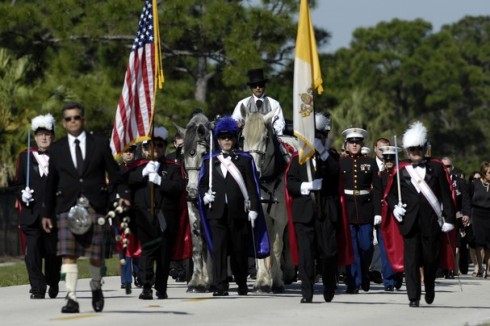
Funeral procession of Marine Lance Corporal Justin Wilson makes its way toward Holy Redeemer Catholic Church in Palm City.
The report below was sent by a Company Commander of the Third Battalion, Fourth Marines serving in Afghanistan. Such a positive report is not the type of thing we commonly see in our papers here and is worth reading.
“I finally have a minute to sit down and write a letter concerning the past few weeks here in Now Zad. I wanted to make sure that I got the word out to everyone, so please send this out to friends and family that I may have missed on the distr[ibution] list. I first want to say how incredibly proud of my boys I am. These Marines have been amazing and continue to be amazing. Between them and the amazing support staff that we have in 3/4 that allows us to do quite literally whatever we want to the Taliban, this has almost been an easy operation. Here are the up sides:
1) Not a single Marine was killed or seriously wounded during this operation.
2) We have taken more ground, run off more Taliban, liberated more villages, and seized more weapons and Home Made Explosives than has ever happened in Now Zad. One of the caches of HME that we blew up was over 1100 lbs of HME (for a reference, that’s over 16 “Mine-Proof” vehicles completely destroyed) and it was the largest find in Helmand Province. Ever.
3) We air inserted two companies, behind enemy lines, while my company went straight up the gut of the enemy’s defense on the ground. The enemy was so terrified that he abandoned his stockpiles and ran away to where he thought he was safe. Some of them ran right into the arms of the British Battalion to our East, some of them we have hunted down since they ran.
More importantly, we have begun to HOLD the ground by immediately building coalition positions in strategic locations all over the valley and partnering with the local Police and Army units. Let’s not forget, the infantry is a TERRAIN based organization. We don’t have to kill people in order to do our job, only if those people don’t want us on that specific piece of dirt and wants to come get a taste.
4) We aggressively sought out and crushed a Murder and Intimidation racket that was going on in our AO. (M&I campaigns are used when the enemy has no other tactic but overwhelming fear to instill on the local population. The ‘night letters’ that were being delivered said things like: “If you accept help from Coalition Forces we will kill your children one by one…” Except that Marines got to the letter writers first. Whammy.
5) We have re-opened a once deserted town to the people and have begun to pay them to clean it up. Quick cash infusion + Heavy labor for young men + promise of more work = no young guys re-enlisting in the Taliban. One of the key components of this plan was to instantly follow up with a Civil Affairs Group that would handle local national problems that weren’t related to the Taliban (food, shelter, work, etc…)
6) We have begun Medical Programs for the locals with what supplies we have. Those supplies are limited, but they are able to cover things like burns, and kids stepping on mines (yes, we MedEvac them just like we would a Marine), and skin rashes, and even an infant with pneumonia who is just fine, now.
7) Our engineers breached a mine-field that had completely frozen other forces. Our Danish friends brought some tanks to help us out and they were able to break up one or two ambushes for us. Nothing is cooler than getting ambushed and having tanks with you to respond. Nothing.

Lance Corporal Jeremy R. Riddle, looks through his scope for any threats in Kabul, Afghanistan. (February, 2003)
8.) Your Marines stayed on point, in the freezing cold weather, with the rain soaking them to the bone, to hunt down the Taliban who had been abusing, killing, and stealing from the people of the Now Zad Valley.
9) We are bringing back government into Now Zad, so people have an alternative than the Taliban to settle their legal disputes, and have someone to hold accountable for a lack of medical coverage, and to go to with their grievances about farming and commerce and security. They won’t NEED us to hold them up any longer.
If all of this sounds like hubris, maybe it is. But I’m so proud of my Company and my Battalion for the planning and the execution and the follow through that they have done. Be proud of your Marines, they did good workin December. Merry Christmas to everyone. Much Love to all, let your friends know, we’re winning and it feels good.”
For nearly twenty years, a crowd has gathered at Fort Benning in mid-November to protest against the activities of the Western Hemisphere Institute for Security Cooperation (formerly called the School of the Americas) and demand its closure.
The annual event is more than just a protest. It is a gathering of the scattered fringes of the religious, political and cultural left who use the event as a platform to push ideas that range from drug legalization to abortion or even women’s ordination. Leftist Maryknoll Father Roy Bourgeois leads this gathering which includes a large collection of socialists, liberation theology advocates and anarchists. It is no surprise that the 71-year-old priest automatically incurred excommunication for openly opposing Church doctrine.
For nearly twenty years, both he and his protesters have resisted the Army’s efforts to “dialogue.” They reject outright the Army’s unconditional offers to open its doors to any who wish to review the school’s operation.
Nearly twenty years of protest calls to mind another twenty-year milestone – the fall of the Berlin Wall. In light of this commemoration, we offer some considerations.
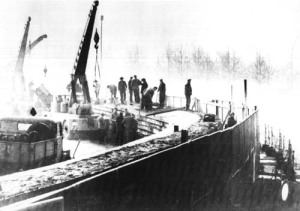
East German construction workers building the Berlin Wall, November 20th., 1961.
A Continued Danger
On the twentieth anniversary of fall of the Berlin Wall, we might be tempted to think that the world’s great military dangers have passed. However, that is not the case. We still live in a world of violence and uncertainties. Our enemies are no longer concentrated behind an Iron Curtain but are scattered about the world in the form of radical groups and rogue nations all too willing to threaten the peace.
With the fall of the Berlin Wall, one would hope that at least the outdated Marxist ideas that caused so much misery all over the world would be consigned to the dustbin of history. However, that is not the case. Guerrilla groups in Latin America like Colombia’s FARC still defend their outdated Marxist ideas through violence and bloodshed. There is still Stalinist North Korea, poverty-stricken Cuba and Communist China oppressing its people and trampling on human natural rights. There is Hugo Chavez’s Venezuela exporting his Bolivarian socialist revolution across Latin America – including the building of a nuclear program.
Twenty years after the fall of the Berlin Wall, it would be hoped that the terrors of our age might also fall. However, that is not the case. Terror or the threat of terror lives as the tactic of choice among Islamic radicals who can be found in Iraq, Afghanistan, Pakistan, Sudan or Palestine. Iran’s mullahs stand ready to develop nuclear arms. Suicide bombers strike terror into whole nations and put fear into the hearts of thousands who might become the next innocent victims.
Pacifists Do Not Keep the Peace
Now more than ever, we need the soldier to keep the peace.
We note, however, that it was not the pacifists that brought down the Berlin Wall. Theirs was a constant message of concession, “dialogue,” and defeat.
When the terrible wall came crashing down, these Marxists were nowhere to be found to condemn the massive misery that lay exposed in those communist countries. They did not renounce their adherence to this system which they fought so hard to impose upon the West.
We tend to forget that it was the soldier that helped bring about the fall of the Berlin Wall. The soldier took upon himself the thankless task of confronting evil by force of arms. It was the soldier that risked all to do his duty wherever he was called to go without hesitation or complaint. The American soldier and his counterparts all over the world stood down the Communist threat in Europe, Asia and Latin America.
His services are no less needed in our days.
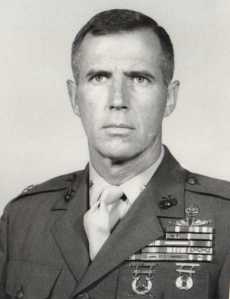
Colonel John W. Ripley
Thank the Heroes
Thus, we need to thank – not protest – these heroes who put their lives on the line. These heroes guarantee the peace. We live freely because they made the greatest of sacrifices – even that of life.
We remember Medal of Honor heroes like Private First Class Ross A. McGinnis who distinguished himself by acts of gallantry and intrepidity above and beyond the call of duty when he threw himself upon a fragmentation grenade and saved four soldiers from certain serious injury or death in Iraq in December of 2006. We remember Navy Seal Michael Monsoor, who likewise unselfishly gave his life, in order to save his fellow Seals on September 29, 2006.
We can also remember heroes like the late Col. John W. Ripley whose heroism in Vietnam was legendary. These and so many more make up those legions of heroes that deserve not our scorn but our gratitude.
Where Will They Turn?
There are those who protest against the soldier. They see his role as one buttressing structures of oppression and power. They are ready to label those who still fight against Marxism as murderers and assassins. They turn a blind eye to a ruthless enemy who breaks all rules and conventions as Marxists have always done. They would deny defenseless populations the training and tools needed to defend themselves against this enemy.
In the case of the Western Hemisphere Institute for Security Cooperation, they ignore the fact that the overwhelming majority of its graduates have committed no crime save that of wanting to keep their country safe and free. They are prepared to amplify any alleged crime of a soldier to gigantic proportions while reducing to nothing the blatant abuses of Marxists in countries like Cuba, China, Nicaragua, and Venezuela.
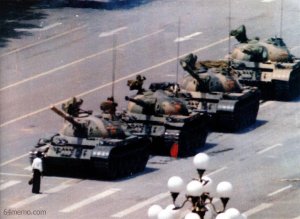
"Who will be there to defend them?"
We ask those who protest: When the fury of the terrorists turns upon them, who will they appeal to? When their freedom is taken away with the same disregard as Colombia’s FARC guerrillas take the freedom of their innocent hostages, where will they turn? When their right to protest is met with bullets and tanks like that of Tiananmen Square, who will be there to defend them?
They will turn to the soldier who defends even those who calumniate him.
A Call to Gratitude
The American Society for the Defense of Tradition, Family and Property (TFP) calls upon the public to thank the heroes.
Let us thank them for standing up to the Soviet menace that lurked behind the Berlin Wall that fell twenty years ago. Let us thank those who still fight and keep our nation safe and help other nations do likewise.
Let us, of course, censor any abuses, but let us also be consistent and condemn the systemic and widespread abuses that have come from Castro’s Cuba, the FARC guerillas and other leftist movements who still uphold the outdated and iniquitous Marxist ideologies that built the infamous Berlin Wall.
As Americans, let us be proud of our heroes as they continue to fight and train others to defend their nations against those who threaten the peace.
May God protect them and their families in their daily battles around the world.
One year ago Lt. Brian Brennan lost both of his legs to a roadside bomb while leading a patrol in Afghanistan. The explosion which left him lame took the lives of three of his fellow soldiers with the 101st Airborne Division. Brennan also suffered a brain injury so traumatic his family wondered if he would ever be the same. As he lay on his bed in a coma, doctors said he might never fully recover.
One day he received a visit from Gen. David Petraeus who had once commanded the 101st Airborne. The Four-Star- General said several things to try and encourage Brennan and bring him out of his coma, but there was no reaction in the patient. When he was about to leave he tried one last thing. He looked at Lt. Brennan and yelled out one simple word, Currahee! A Cherokee Indian word that means “stand alone”. It was also the nickname for the famed Band of Brothers regiment of the 101st. Airborne, that Brennan was part of. What happened next defied all logic and is truly inspiring. A man who had been unresponsive for over three weeks began banging his stumps in what must have looked like an attempt to come to attention.
He not only made a full recovery, but is now walking with the help of prosthetics. Once again we have another example of how bombs can take an American soldiers legs but they cannot take his courage nor his valor.
Moving video of Lt. Brennan:

